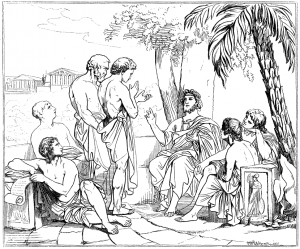This is a question I thought about from a while back. During our readings on knowledge, it seemed to me that the ancient philosophers liked to write about how they would educate their citizens in order to reach their ideal worlds, while the Enlightenment philosophers taught about how they believed the process of knowledge works without setting up definitive restrictions of how people should be controlled. For instance, Plato talks about the Myth of the Metals as a means to maintain order in The Republic while Hegel writes about the didactic method of obtaining knowledge. This makes me question as whether knowledge is a means or an ends. Is the use of false knowledge (Myth of Metals) morally corrupt if it accomplishes the goal of a peaceful city?
Combining this with the more recent discussions of education, I begin to see how modern education thinkers would answer this question. Gatto would see many problems with using education as a means for a “higher” purpose, as he criticizes many aspects of the restrictive classroom in his speech “The Seven-Lesson Schoolteacher”. If the teachers are using their authoritative power to tell lies to students, then the education system would be a lie in itself. Freire would criticize the “education as a means” theory because it fits exactly into the banking method of education he seeks to eliminate. Lastly, Dewey would find it fundamentally wrong and detrimental to personal growth is the student was exposed to an educational experience based off of lies and deception. All in all, none of the modern thinkers would use education as a means toward maintaining order.

3 responses to “Knowledge: Good or Evil?”